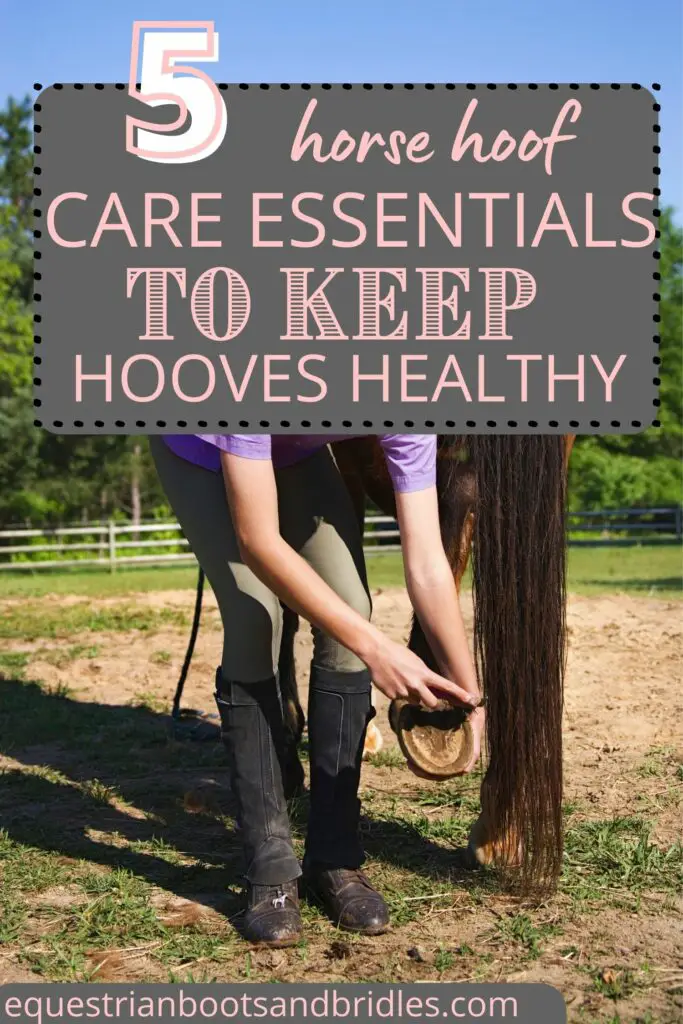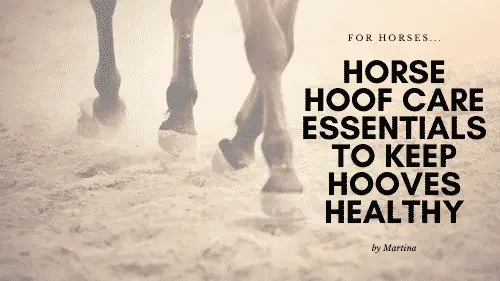Hoof care is easy to take for granted until you’re having an issue with your horse’s hooves and you realize how important they are! In this post, I cover the essentials to ensure your horse’s hooves stay healthy and sound.
There’s a popular understanding that horses have what’s known as a “delicate constitution,” which basically means they get sick easily. While I think that’s somewhat exaggerated, I do care a lot about keeping my horses healthy… and I’m sure you do, too! Horse hoof care is one of the most important aspects of horse health.
Horses spend so much time on their feet. Their hooves are exposed to lots of impact, especially when you’re riding them. They’ll also cover lots of different surfaces, which means they can end up with various types of material stuck in their hooves.
Although your horse’s hooves might seem pretty robust, they’re actually susceptible to a lot of issues. So today, we’ll talk about a couple of common hoof care issues, and then discuss what you can do to alleviate them.
Potential Problems with Your Horse’s Hooves
Before we talk about the hoof care itself, let’s talk about two of the main drivers for what could be negatively affecting your horse’s hooves (or could in the future!).
Long Term Exposure to Unsuitable Conditions
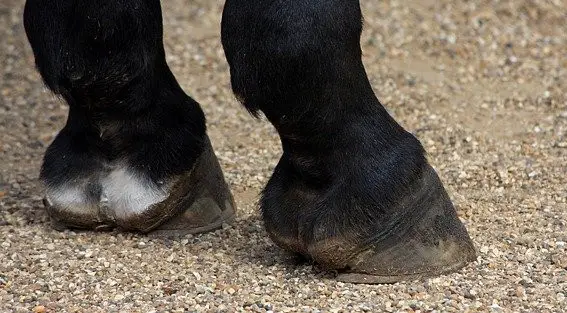
As a general rule, your horse’s feet will be healthier when they’re drier. (Just like yours!)
If their hooves are left wet for too long—particularly if they are in unsanitary conditions—you could be exposing them to risks. These include the risk of cracking or developing bacterial infections like thrush or white line disease.
For example, the spring in Ontario, Canada (where I live) is super rainy and not that warm. This means the fields can get really muddy and not dry properly for weeks at a time. It’s really easy for hooves to develop thrush in these conditions. In fact, one of my horse’s best friends in the field developed thrush the other week as I’m updating this post because of this exact reason.
What’s somewhat surprising though is that repeated exposure to moisture, with intermittent drying, is often the culprit in cracked hooves. This is common over summer, when their hooves get wet by morning dew and then dry during the day. But it can also be caused by over-washing of your horse. So be careful!
What is Thrush?
Thrush is basically a bacterial or fungal infection in a horse’s frog (which is the triangular part of the hoof’s underside). It can be painful and requires treatment.
Inappropriate Use of Dressings
If you’ve ridden or owned a horse for a while, you’ll probably be aware of the controversy around hoof dressings: solutions applied to the hoof, allegedly to make it healthier. If you’re interested in knowing more about that controversy, I actually have a whole post on the reasons why you might not want to use dressings on your horse’s hooves. So I recommend reading that!
But in short, a lot of the dressings available on the market contain harmful chemicals, which actually damage your horse’s hoof, instead of helping it.

They can also expose your horse to that wet hoof issue: by adding too much moisture to the hoof, the hoof wall could soften and then crack. Which is not what you want!
Having said that, I want to be clear: dressings are different from polish. Dressings penetrate the hoof, while polish sits as a coating on top. Polish is much safer to use on your horse’s hooves.
Hoof Health Care: Fixing Those Problems!
Now with some possible causes covered, let’s jump right into my five favorite solutions to improving your horse’s hoof health.
Solution #1: Regular Hoof Picking
The first thing that I always recommend doing (whether you’re having problems with your horse’s hooves or not) is regularly picking your horse’s hooves.
This should be a standard part of your post-ride grooming regimen and is essential to long-term hoof quality.
If you’re not familiar with how to pick your horse’s hooves, I actually have a guide you can read here!
Picking helps you get mud and other debris out of your horse’s hoof after a ride. This is critical to help dislodge rocks from horse hooves, which can cause irritation and even abscesses.
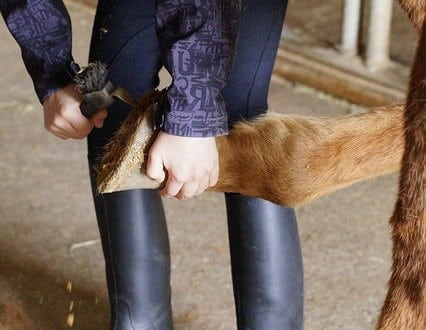
Spending time picking will also familiarise you with your horse’s hoof – and little things like changes in temperature or the strength of the pulse in your horse’s hoof can be indicators of issues.
While we’re talking about grooming, let’s also quickly side-track to washing. Like I said above, sometimes horses that are washed frequently experience issues with wet hooves. So if you are washing your horse more than once a month, maybe ease off and see if that makes a difference. Here is some more guidance on how to wash your horse properly.
Solution #2: Seeing a Farrier
In addition to your own regular hoof care through picking, I recommend having a farrier see your horse regularly.
A farrier is an equine hoof care professional who can trim your horse’s hooves for you. Because yes, hooves grow over time—just like our fingernails do!
They will also determine if your horse should be shod, and re-shoe your horse as necessary.

How regularly your horse should see a farrier is really a question of how fast your horse’s hooves grow. The farrier you see should be able to advise you on this, but usually every six to eight weeks is an average length of time.
A farrier will be able to diagnose any problems caused by environmental issues, like the thrush I mentioned above. They will also be able to identify punctures or the early development of abscesses. Then they can let you know how best to address the problem.
Solution #3: Keep a Clean Stable
If your farrier does find a case of thrush or white line disease, then I can bet one of the first things they’ll tell you to do is keep a clean stable.
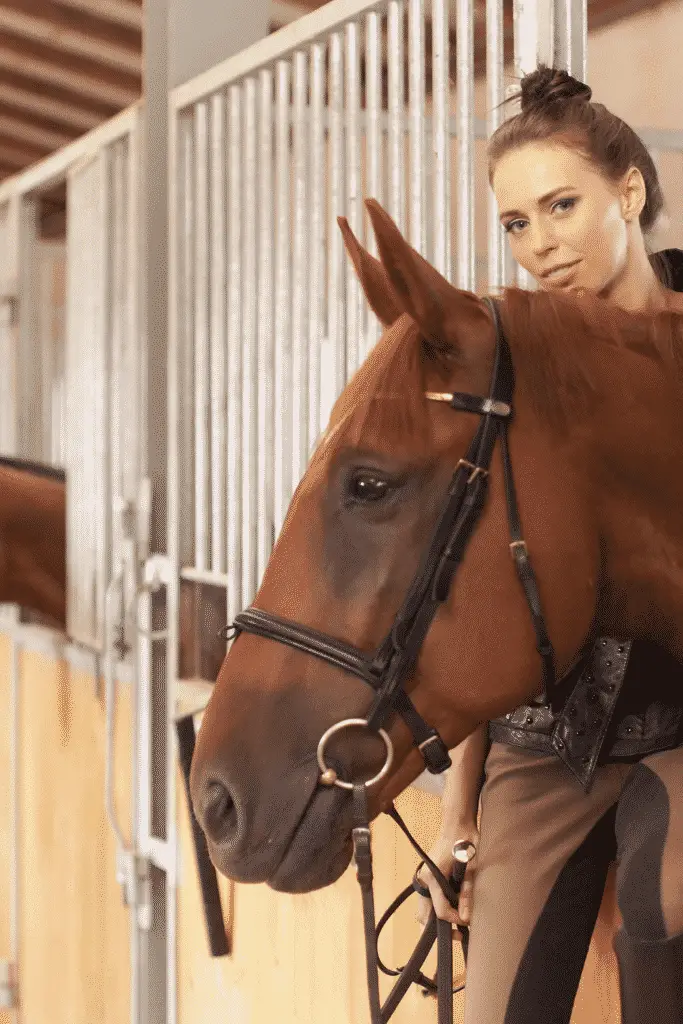
Make sure you’re mucking out regularly, so your horse isn’t exposed to manure for too long. You should probably do this anyway because it’s kind of gross, right?
Even just making sure the stable is nice and dry could make a huge difference—and your horse will probably thank you for it anyway!
Solution #4: Give Them Plenty of Exercise!
Who would have thought that exercising your horse could actually gradually improve hoof health?
Actually, consistent exercise can really help keep your horse’s hooves healthy. When your horse walks or trots, blood flow to the hooves is increased. This circulation leaves them less prone to developing infections. It also promotes stronger, faster hoof growth.
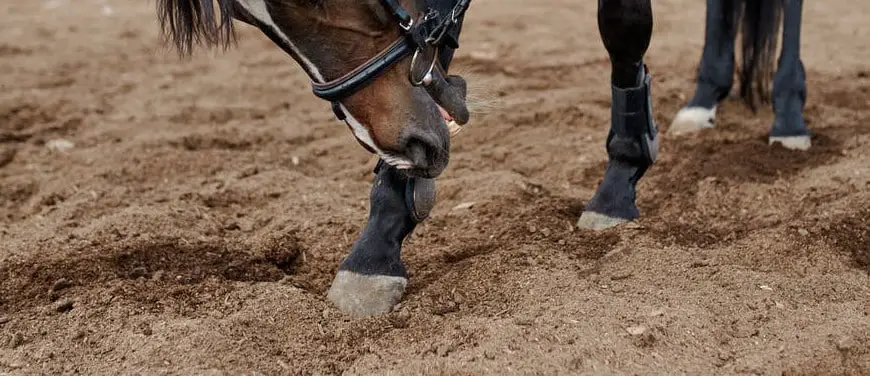
The key thing is not to overdo it. Be sure to check and pick their hooves afterward, paying attention to any caught stones or possible punctures.
Solution #5: Proper Horse Nutrition
My final hoof care solution is to make sure your horse is getting a healthy diet.
Getting a lot of fresh green grass would be ideal for hoof care. However, that’s just not realistic for a lot of the climates in which people live and have horses.
If you’re worried about your horse’s nutrition, there are a couple of things you can try, including hoof supplements. The first I would recommend would be Vitamin E. Green grass is rich in Vitamin E, and if your horse isn’t getting a lot of grass, they may become deficient.
You can read more about the signs of deficiency here. Or, if you’re already confident that that’s what your horse needs, you could invest in some Health-E Vitamin E.
Alternatively, providing more Omega-3s in your horse’s diet could do the trick. These fatty acids are critical to hoof and hair growth. Generally, they’re supplemented through fish or krill oil. I love Antarctic Krill – and it does wonders for my own hair and nails too!
There are plenty of other supplements you can try if you think diet might be the issue.
However, I would caution you against over-supplementing. Usually adding too much of a dietary supplement won’t cause harm, but will just be expensive and unnecessary. But occasionally you can actually hurt your horse. You should consult with a vet or equine nutritionist if you’re not sure about the supplements you should be giving your horse.
More F.A.Q.s About Hoof Health
How Often Should I Clean My Horse’s Hooves?
You should really clean your horses hoove’s every day or at least every time you take your horse out for a ride. You don’t necessarily have to spend a ton of time cleaning the hooves each time; you can just quickly make sure there is nothing stuck in them using a hoof pick.
Although new horse owners may be intimidated by hoof picking, it will get easier as you do it more often! Here is a guide to help you learn how to pick up your horse’s hooves and clean them properly.
What Happens If You Don’t Trim a Horse’s Hooves?
Overgrown horse hooves can become a problem, too. To read all about how to prevent and fix overgrown horse hooves, check out this guide.
How Do You Know If Your Horse’s Hooves Are Healthy?
There are a few ways you can tell whether your horse has poor hoof quality or not.
Hoof Appearance
The first thing is to simply look at your horse’s hoof. If you notice that your horse’s hooves have cracks or inconsistencies in color, those are indications of poor hoof health.
Your Horse’s Behavior
If your horse is experiencing hoof problems, you might notice a change in their behavior (if you’re paying attention!). Long-term hoof problems could potentially lead to a lame leg, so be sure to watch for things like limping or increased sensitivity when you’re cleaning their hooves. If you do notice your horse walking or acting differently, be sure to contact your veterinarian immediately.
Ask Your Vet or Farrier
Of course, if you’re unsure about whether or not your horse’s hooves are healthy, asking your veterinarian or farrier is always a safe bet!
Hoof Care: You Can Do It!
I hope you’re now feeling better informed about hoof care for your horse.
I know the variety of possible solutions can be a little overwhelming. But I would recommend giving a few of them a try – I can promise you that all of them will have other benefits for your horse, even beyond just their hoof care. And they’ll love you for it!
If you have any questions at all for me about horse hoof health, feel free to ask in the comments below.
Happy riding!
Did you enjoy this read? Pin it!
